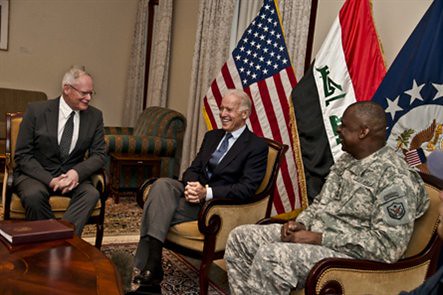Nathan Crites-Herren
The Paw Print
Marking the official withdraw of U.S. troops from Iraq by the end of this year, Vice President Joe Biden arrived in Iraq on November 29 for an unannounced visit. Shi’ites supporting Iraqi cleric Moqtada al-Sadr held an anti-U.S. protest in Basra to oppose Biden’s visit. In the interim, the Financial Times reports that numerous investment bankers are arriving in Iraq to secure potentially lucrative reconstruction and oil deals even though security remains a concern.
Vice-President Biden’s visit comes amongst continuing violence in the country, often targeting police and security forces. Three bombs exploded outside a local official’s house in Iraq’s northern oil-rich city of Kirkuk on Monday, Nov. 28, killing one civilian and wounding at least 15 others.
Shi’ites protesting Vice-President Biden’s visit feel that the U.S. has alternative motives for post war Iraq which could jeopardize the already unstable security situation in the region. “The U.S. troops will leave within a month, but there’s something going on behind the scenes which the Iraqi people do not know about. Some kind of an agreement between Biden and the Iraqi government, for this reason, we have staged a protest. We warn everyone against any agreement that will harm Iraq’s security,” said Hussein Mizel chief organizer of the protests.
Biden is expected to thank American and Iraqi troops and to start talks on a new phase in U.S.-Iraq relations. On Nov. 29, the White House Spokesperson Jay Carney affirmed the administration’s commitment to ending the war. “I just want to note that President Obama, when he was running for this office, made clear that if elected, he would end the war in Iraq responsibly. What we’re seeing happen in these final six weeks of the year is the fulfillment of that promise, where we are withdrawing remaining U.S. forces from Iraq and we are ending that war responsibly and giving the Iraqi people the chance for a better future that they deserve, and also maintaining an import strategic relationship with Iraq.”
Part of the U.S. withdraw strategy from Iraq includes a training component which will see 4,000 U.S. Military trainers deployed to Iraq in order to help train newly formed Iraqi defense forces. White house representatives that proper military training for Iraqi forces is an essential step in bringing stability to the country. However, Iraqis and Iraqi leaders have a different perspective. “What Iraqis believe in general is that Iraqi Armed Forces are facing a crisis, but it’s not a crisis of training, it’s a crisis of legitimacy. People don’t see them as nationalist armed forces that are concerned with Iraq’s security. Instead, they see them as militias who are loyal to their political parties or sects or whatever. So, the U.S. presence will not solve this crisis of legitimacy from an Iraqi point of view,” said Raed Jarrar Iraqi political analyst.
Currently, the U.S. plan is to leave 16,000 U.S. personnel under the U.S. State Department’s mission, this includes military trainers and armed military contractors. Despite recent criticisms from the State Departments own inspector general, Harold W. Geisel about the number of U.S. personnel staying in Iraq after the official withdraw date, the Defense Department has decided to continue with their plan. “I think downsizing the U.S. diplomatic footprint is a must. So, even if the U.S. ends its military occupation by the end of the year as was agreed upon, I think the next step is to pressure the State Department to downsize its mission to a regular size,” said Geisel.

What’s Been Said…